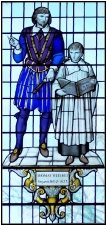| |
 
COMPOSERS FROM
HAMPSHIRE AND WEST SUSSEX
 |
|
Thanks to the
Musical Festival, the Southern Orchestral
Concert Society, Petersfield Orchestra
and the Operatic Society, musical
performance over the last century in the
area has been well documented. And few
areas can have such a rich tradition. But
what of the art of composition? The
recent death of Michael Hurd, often
insultingly referred to as a local
composer when he was internationally
known, has prompted a few investigations.
Documentary evidence takes us right back
to Elizabethan times, when two important
composers were born within a few years
and a few miles of each other. The elder
was Thomas Weelkes, who was baptised at
Elsted on 25 October 1576. He became
Organist at Winchester College at the age
of twenty-two and moved to Chichester
Cathedral in 1602, where he remained for
the rest of his life. |
Whereas many of his great
contemporaries, Byrd and Morley for example, were
members of Her Majesty’s Chapel Royal,
provincial life seems to have suited Weelkes, for
in between composing wonderful madrigals and
anthems, he was given to bouts of heavy drinking,
and was eventually dismissed from his post for
being a common drunkard and a notorious swearer
and blasphemer. He was, however, reinstated, but
seems not to have reformed. He would surely have
approved of the men’s chorus at the 1934
Festival lustily singing Come Sirrah Jack ho!
Richard Deering was a far more restrained
character, born at Liss in 1580. As a young man
he travelled widely, and found work in Venice,
where he converted to Catholicism, and in
Brussels, before returning to England as organist
to the Catholic Queen Henrietta Maria. Most of
his music was set to Latin texts, so never sung
outside Henrietta’s chapel, though his Quem
vidistis pastores? features today in many
cathedral music lists at Christmas.
The following two centuries produced only two
composers that I can find who were born in
Hampshire. Charles Dibdin, composer of Tom
Bowling, was born in Southampton in 1745 and from
the next century the much maligned Sir John Goss
was born at Fareham in 1800. He was organist at
St. Paul’s Cathedral for many years, and is
still remembered for his immortal hymn Praise my
Soul the King of Heaven and the carol See Amid
the Winter Snow.
The twentieth century was rather more productive.
In 1902 Arthur Ponsonby MP bought Shulbrede
Priory. Dorothea, his wife, was the daughter of
Sir Hubert Parry, who was a frequent guest,
composing Shulbrede Tunes for piano during one of
his visits. Peter Warlock, too, was a regular
visitor to the area towards the end of this life,
frequently spending the summer at Dene Cottage in
West Harting. It is said that his final song, The
Fox, was inspired by a fox’s head behind the
bar of The Fox at Bramdean, where he also used to
stay at the home of the poet Bruce Blunt.
Many notable composers have been connected with
the Petersfield Musical Festival from its
earliest days, beginning with Sir Arthur Somervel
and Ralph Vaughan Williams, who were present in
various capacities during the first twenty years.
Gustav Holst, too, was an adjudicator in 1920,
6the year of the first performance of The
Planets. Herbert Howells appeared many times
between 1928 and 1951 and Armstrong Gibbs, whose
famous song Five Eyes was sung by every school
choir, was another regular. In 1933 Sir Walford
Davies, soon to become Master of the King’s
Music, was one of the adjudicators. His Solemn
Melody, with its poignant cello solo, was for
ever on the radio in my youth. Several cathedral
organists, all composers in their specialist
field, also appeared: Charles Brewer, Herbert
Sumsion, Douglas Guest, Bernard Rose, Lionel
Dakers and Alwyn Surplice. And the composer of
Faire is the Heaven, Sir William Harris, organist
of St. George’s Chapel, Windsor, retired to
live at Liss.
One name which crops up again and again is Sir
George Dyson.. He was born in Halifax in 1883 and
after studying in Italy and Germany taught in a
succession of public schools, including
Winchester College. From 1937 until 1952 he was
Director of the Royal College of Music. His part
songs were regular competition pieces from 1927
onwards, and in 1956 the Festival commissioned
Agincourt from him to celebrate its half century.
The composer himself conducted. Towards the end
of the century his music fell somewhat out of
fashion, but not before Richard Seal had
conducted Hierusalem in 1977. Thankfully, for
such a prolific choral composer, there seems to
be a swing back to favour at present, and I
understand that Agincourt is to be revived here
next year.
From 1939 until the end of his life Gerald Finzi
lived overlooking the Downs at Ashmansworth, in
the far north of the county, and it was here that
he wrote some of his finest music. Michael
Hurd’s connection with the Festival, and
with music in Petersfield generally, has been
well documented. It began as an adjudicator in
1966, and by the time of his death last year he
had held just about every office available,
whilst at the same time having a busy career as a
composer, author and broadcaster.
But what of the present generation? A familiar
name is Geoffrey Burgon, composer of the music
for Tinker, Tailor, Soldier, Spy and Brideshead
Revisited, who was born at Hambledon in 1941.
Neil Gardner, from Hawkley, saw his Partita
performed at the Festival in 2003, Ian
Schofield’s Sing Alleluia was commissioned
for the 100th Festival and Jonathan Willcocks,
one of the country’s leading choral
composers, is well known here. Peter Thompson is
active as a teacher and conductor of PASSO,
whilst Martin Read, head of music at Alton
College, was chosen as Hampshire’s
Millennium composer. I’m sure there are
more, so good luck to all of them!
Tom Muckley, February 2007
This article was originally
published by the
Petersfield Post
tommuckley.co.uk
|
|


